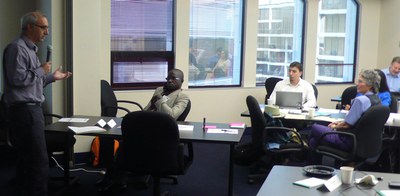FCMC Co-organizes CARPE Technical Toolkit Workshop

On May 15 and 16, FCMC staff co-organized and participated in a workshop focusing on a series of technical tools developed by partners of the Central Africa Regional Program for the Environment (CARPE), a flagship USAID environmental program. Representatives from a wide range of organizations, including USAID, University of Maryland, World Resources Institute (WRI), the US Forest Service (USFS) Michigan State University and several NGOs and private sector forest-carbon project development groups were present at the workshop held in Arlington, Virginia.
Since 1995, CARPE has worked on issues related to decreasing deforestation and forest degradation and preserving biodiversity in the Congo Basin. Recently, CARPE has begun transitioning into its third phase, with the objective of maintaining the “ecological integrity of the humid forest ecosystem of the Congo Basin” and supporting Central Africa’s transition to climate resilient, low emissions development through sustainable management of biodiverse forests. The goals of the May workshop were: to better understand current CARPE goals and objectives on how to achieve the greatest impact with existing tools for supporting National REDD+ Strategies and Action Plan initiatives (RSAPs) and Low Emissions Development Strategies (LEDS) in the region to improve linkage and data compatibility between landscape and jurisdictional level REDD+ activities and national level processes for monitoring, reporting and verification (MRV) of the impact of REDD+ policies and measures; to determine how partner tools for biodiversity conservation and climate mitigation processes complement and connect with each other; and to surface gaps in information or compatibility and find additional applications of analytical tools.
The workshop was led by Ken Creighton, CARPE’s Senior Global Climate Change Specialist in Kinshasa. FCMC staff co-organized the event with support from the USFS Office of International Programs and Training Resources Group. Participants from the Food and Agriculture Organization (FAO) of the United Nations and USFS gave presentations on RSAPs, MRV and LEDS. Paula Williams, FCMC Senior Director of Social and Environmental Soundness (SES), was part of a panel that discussed SES and Safeguard Information Systems. Marc Steininger, FCMC Senior Director of MRV, along with representatives from African Wildlife Foundation, the Wildlife Conservation Society, Wildlife Works and Carbon and Environmental Resource Associates presented on REDD+ activities under development at landscape and jurisdictional levels in Central Africa. At the end of the workshop, participants identified potential gaps and next steps relating to the presented toolkits and their applications, including the need to make data and methods consistent and accessible to the emerging initiatives to develop national REDD+ strategies and Action Plans and Low Emissions Development Strategies within the Central Africa region.

